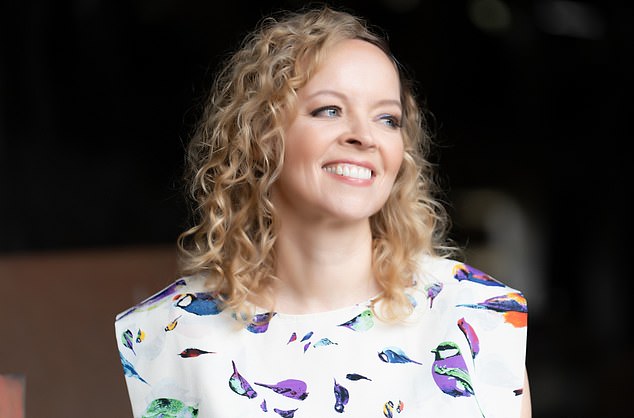It was the end of the evening in a City wine bar drinking my favourite California chardonnay and I reached for my phone to order an Uber.
Even though it was still early and I lived right next to a train station, the soporific blanket of my favourite tipple meant there was no way I could fathom getting on public transport.
Scrolling through my phone on the drive home, a pair of trainers caught my eye and emboldened by the booze in my bloodstream I made a spontaneous purchase.
Next morning, I woke up, not just battling waves of nausea and a gnawing sense of anxiety, but with a dent in my bank balance to the tune of hundreds of pounds, thanks to the taxi home, the new shoes and the extra rounds I’d insisted on buying in the bar.
I couldn’t believe I had done this again.
I never ever went out intending to get drunk. But I would often wake up the next day and there would be parts of the night that I wouldn’t remember.
Feeling physically awful was compounded by huge waves of anxiety and shame, and so I would always promise myself: ‘The next time I’ll be more in control’. But I really struggled.
This was the cycle that I repeated over and over throughout my 30s and into my 40s.

Sandra Parker (pictured) spent tens of thousands of pounds as a result of her drinking habits
I thought I was a ‘classy’ drinker because I had a successful career in investment banking, and my six-figure salary funded the quality wine that I consumed in bars and restaurants with colleagues.
I did a wine tasting course at The Wine and Spirit Education Trust in London, and I’d been to Sonoma Valley, and would often go out with a friend who was a real wine connoisseur and his crowd of fellow bon viveurs. We all felt like we were really cosmopolitan.
Of course, it doesn’t matter what quality the alcohol is if you’re consuming it in large quantities, and I certainly felt it the next morning.
I can’t remember not getting to work because of a hangover but there were certainly times where I didn’t feel great.
If we were going for a night out, and someone suggested dinner beforehand, one manager would say: ‘Eating is cheating’.
People wouldn’t get away with that now, but back in the noughties with the influence of ’90s ‘ladette culture’ still hanging on, it was very much like you had to prove yourself and be able to hold your own.
Working through a hangover next day was seen as part of the job and a badge of honour.
Because the nights out and resulting sore heads were all wrapped up with my career, it created a veneer of respectability. I was ignoring the fact that, no matter what the context, it was still very heavy drinking.

According to Sandra: ‘At the peak of my drinking I was spending £6,000 a year on alcohol and battled the booze for 20 years costing me more than £100,000’
It was only at 48, after a particularly horrendous hangover on holiday in Myanmar, that I finally vowed that I never wanted to feel like this again.
I was sick to death of the anxiety, the nausea, the regret and the shame – but the cost of my drinking was more than just physical.
At the peak of my drinking I was spending £6,000 a year on alcohol and I’ve calculated that my 20 years of boozing cost me more than £100,000.
I would usually drink in a bar or restaurant because of the nature of my work rather than getting drunk at home. Not wanting the party to end, I’d splash out on extra rounds and of course the tabs added up.
Once my inhibitions were lowered due to alcohol, I’d make impulse buys including clothes, shoes and trainers, or spontaneously book a trip away. I’d order Ubers even though I lived beside a station because I was too lazy after drinking to get public transport.
My introduction to drinking came when I was 15 and I started drinking cider with my friends. I would experiment with drinking as I was quite a nervous person, especially about exams. I used to get panic attacks.
My parents would only ever really drink on special occasions, but I came of age in the era of ladette culture. When I started university in Glasgow my friends and I saw drinking as fun and an essential part of student life and our fuel was cider mixed with blackcurrant to mask the taste of the alcohol.
Drinking helped me to relax when I was young and I equated alcohol with giving me confidence. I couldn’t imagine not drinking if it was somebody’s birthday, or we were out at the weekend or if I was on holiday.

56-year-old Sandra stopped drinking in 2018, and has not gone back to alcohol since then – but notes that willpower alone is not enough to overcome alcohol addiction
In 1993, when I moved from Scotland to north London and shared a flat with some friends after qualifying as an accountant, it was very much a work hard, play hard culture.
Every so often I would go out and binge drink. There would often be parts of the night that I wouldn’t remember. It would usually be vodka and Red Bull, knowing the caffeine in it would help me to keep boozing.
I would drink Hooch in my early 20s, I then moved onto wine, Californian Chardonnay became my favourite in my 30s.
If I was on holiday, I would drink every night, I would drink every weekend, I would drink every bank holiday. I would never go out and not drink. So, even if I was going to the cinema with a friend, I would drink, or if I was going out for something to eat.
Sometimes I would have drinks at home, but thanks to my social life I’d be out drinking anything from four nights to seven nights a week. In the run-up to Christmas it would definitely be every night. I would often lose count of the number of drinks that I had, but it would always be at least one bottle of wine.
When you’re younger, there’s a lot of ways you can justify the nights out and the hangovers. But in my 40s it was so bad that I got to the point where I thought, ‘I cannot bear this any longer’.
Every time I had a hangover, physically I would feel sick and have a sore head, as well as feeling exhausted.
Then there was the mental turmoil – shame, embarrassment, anxiety, self-doubt, low mood, procrastination. I would feel really low and disgusted with myself for putting myself in this position yet again.
Over the years I grew less resilient and drinking became harder and harder to handle. My sleep patterns were getting worse and going through the perimenopause was heightening my feelings of anxiety.

After giving up alcohol herself, Sandra (pictured) became a coach and set up a business, Just the Tonic Coaching, to help others stop drinking too
The turning point was a sailing trip in Myanmar in December 2017
I had a really bad hangover in a small cabin on a sailing boat in one of the most beautiful parts of the world on what was supposed to be an idyllic cruise. I couldn’t imagine a worse place to have a hangover on New Year’s Day – the continuous rocking of the boat felt horrendous.
I didn’t venture out of the cabin until 6pm that day and I was annoyed with myself for wasting a day of a week’s holiday. Full of regret as the waves of anxiety and sea sickness washed over me, I vowed to myself I was never going to get this hungover again.
I asked myself: ‘Are you really still doing this in your 40s?’. I felt like I was still stuck in my 20s. I was spoiling my holiday despite promising myself so many times before that I would change.
Why was I doing this again? Why was I ruining such a nice occasion? I’d been talking about giving up the drink for such a long time and something within me snapped. I said to myself: ‘That’s it. I’m never going to get this drunk again’.
I knew it was going to be difficult and I was determined to get proper help. It was more than a New Year’s resolution, but I needed to find the right path to make a change.
I didn’t try Dry January after the holiday because I’d attempted it so many times and it made me miserable. I knew it didn’t work.
AA (Alcoholics Anonymous) was not for me either. I didn’t feel as if my life had hit rock bottom and there was nothing about those 12 steps that I thought would be helpful to me. If I had gone, I would probably have convinced myself that I wasn’t that bad and carried on drinking.

Sandra used to think that ‘drinking was all about fitting in and was fun’ – until she realised that alcohol made her anxiety worse
It took me another six months before I turned to a life coach, who gave me lots of tools to cope with my anxiety, which ranged from worrying about my health, money and being good at my job.
She helped me understand that when we are overly anxious, we tend to catastrophise things. I learned that although I had a lot of worrying thoughts, I could challenge them.
What I hadn’t realised in the past, but I know now at 56 and single is that my anxiety got a lot worse because of alcohol.
It’s not possible to overcome alcohol addiction on willpower alone. I don’t think you can get to a place where you’re really comfortable not drinking unless you tackle the things you were drinking to numb out from.
My coach helped me to tackle the anxiety and handle life without needing to drink. It was harder for me to recognise I had a problem as traditionally it didn’t look like I had one as I wasn’t drinking every night and I didn’t fit into the stereotype of an alcoholic.
I had my last drink on the 30th of June 2018. I had a rosé in a restaurant while I was on holiday in Malaga. That was seven years ago.
I thought if I could change something that was such a big part of my identity, I there was bound to be other people that would benefit too.
In 2019 I set up Just the Tonic Coaching and have helped people from across a wide age range from a student in her early twenties to a woman in her 80s.
More than 90 per cent of my clients are completely alcohol free in the final month- and feel that they are in control. They are choosing not to drink because they no longer need to, rather than fighting a desire to drink. The mantra of my business is ‘control over alcohol by building self-esteem’.
The programme is a mix of group and one-to-one coaching to take back control over alcohol so they no longer feel deprived.
People tell me they are better parents, sharper and more focused at work, sleeping better, eating healthier and generally feeling good about themselves – sometimes for the first time in decades.
I feel for women of my generation who have been so conditioned to feel that heavy drinking is normal – to feel they have to be ‘one of the lads’ because of their careers.
Men also make up to 40 per cent of my clients and the number is rising.
I believe heavy drinking is a problem that affects women and men equally. There’s still a lot of shame and many people are too embarrassed to talk about it even now.
It shouldn’t be this way. If you can tackle the reasons you’re drinking to excess, it will be the best thing you ever did.









